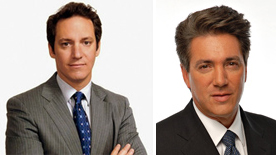 Noyack Medical Partners’ CJ Follini (left) and Corcoran’s Paul Wexler
Noyack Medical Partners’ CJ Follini (left) and Corcoran’s Paul WexlerLike many other segments of the commercial market, health care real estate is in a “wait-and-see” mode right now — but not just because of the economy. The Obama administration’s proposed health care reforms could lead to significant changes in health care facilities, and consequently in real estate, CJ Follini, managing principal at Noyack Medical Partners, told about 30 attendees at a Real Estate Board of New York seminar this morning.
“If you think housing is the most important thing [for the economy right now], you’re wrong,” said Follini, who founded Noyack, which acquires and manages health care real estate. “It’s health care.”
The health care reforms currently on the table could lead to the creation of smaller, more specialized clinics and bring millions of uninsured Americans into the health care system, Follini said. Doctors and hospitals will be in the market for clinic spaces, he said. And there will be less need for large hospital campuses, many of which will need to be sold and repurposed. Noyack is already turning the former St. Agnes Hospital in White Plains into a $250 million campus with a variety of living options for seniors, Follini said.
Paul Wexler, president of Corcoran Wexler Healthcare Properties, who did not attend the REBNY event, agreed that if health care is reformed, “there may be different types of needs for the way that health care is delivered, and you may see different types of health care services provided in a different setting than the traditional one you have now.” But demand for medical space will remain a constant, he said.
Follini suggested that empty storefronts, such as those left by the closure of Circuit City, could be converted to medical clinic space, as could office condo buildings. Noyack purchased one Midtown condo building in October and plans to outfit the building with medical offices and sell them individually, Follini said.
But doctors may be priced out of certain neighborhoods and buildings.
“You have a competing retail market that will still keep doctors priced out of most retail locations,” Wexler said. “It will just be a market question that will be dictated by market conditions.”
Wexler said that while doctors may not be able to afford some high-profile retail spaces, landlords in “off the beaten track” locations might welcome medical tenants, who tend to be more stable than retailers.
Regardless of the specific changes health care reform might bring about, both Follini and Wexler said the medical real estate market is and will remain healthy. Follini said occupancy at Noyack properties remains high and rents are increasing about 3 percent annually despite the downturn.
Wexler said Corcoran Wexler has been having an unusually active summer.
“People who have specific needs are out there,” he said.